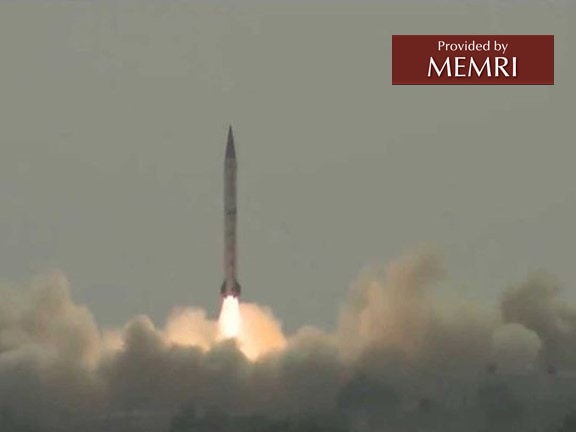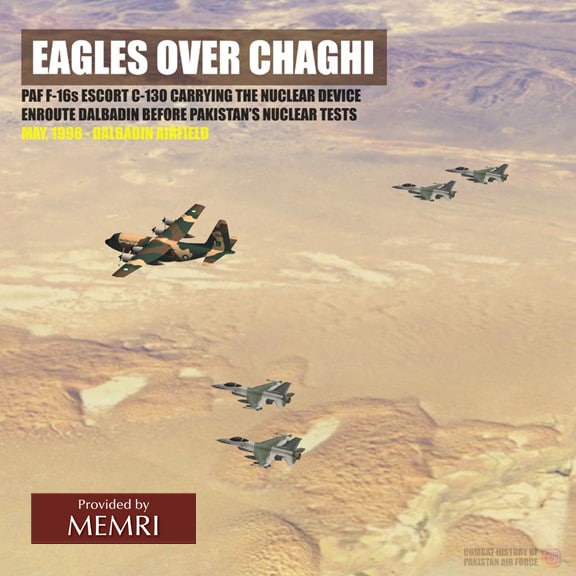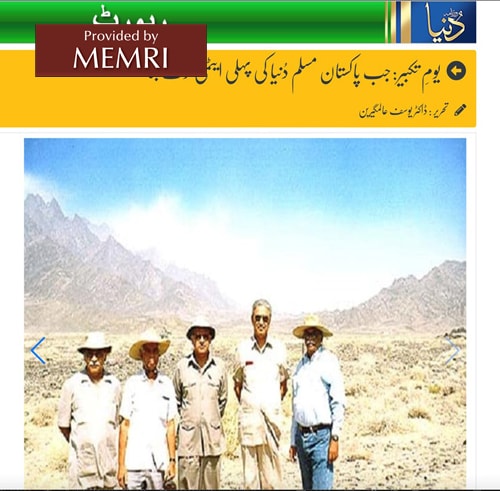On May 28, 2023, newspapers in Pakistan marked the 25th anniversary of Pakistan's nuclear tests that 25 years ago. In Pakistan, May 28 is celebrated as Youm-e-Takbeer ("the Day of Greatness").
In an editorial titled "The Silver Jubilee [i.e., the 25th anniversary] of Atomic Pakistan," the Urdu-language newspaper Roznama Jang wrote: "May 28, 1998 is the memorable day when Pakistan emerged as the first Islamic nuclear power in front of the world and made the country's defense invincible..."
To mark the day, Roznama Dunya, another high-circulation Urdu newspaper published from several cities of Pakistan, published an article titled "Youm-E-Takbeer: When Pakistan Became The First Atomic Power Of The Muslim World." The article noted: "Pakistan had no choice but to carry out its own nuclear tests in response to India's nuclear explosions. World powers were not in favor of it, but Pakistan did not accept any pressure."
According to a 2022 Yearbook of the Stockholm International Peace Research Institute (SIPRI), Pakistan had 165 nuclear warheads in 2021 and 2022, while the number of India's nuclear warheads rose from 156 in 2021 to 160 in 2022.[1]

Pakistan test-fired long-range ballistic missile Shaheen-III in 2021
Following are excerpts from the Roznama Jang editorial:[2]
"Undoubtedly, Pakistan's Nuclear Capability Has Enhanced Its Importance And Stature – Now It Is Our Collective Responsibility To Not Only Maintain This Global Prestige"
"It has been 25 years since Pakistan became a nuclear power. May 28, 1998, is the memorable day when Pakistan emerged before the world as the first Islamic nuclear power and made the country's defense invincible by conducting successful nuclear tests. The day is remembered as Youm-e-Takbeer.
"Today, the entire nation is celebrating this glorious success of the Silver Jubilee with the renewal of commitment that neither any harm will be allowed to come to the defense of Pakistan, nor any compromise will be made in honoring the sacrifices of the martyrs who have laid down their lives for the protection of the motherland.
"Pakistan actually carried out these nuclear tests in response to India's nuclear explosions [on May 11-13, 1998]. India, which had conducted its initial nuclear test in 1974 and then carried out six nuclear explosions in May 1998 under its nefarious ambitions, sounded the bell of danger not only for Pakistan but also for the peace-loving nations of South Asia and the entire world.

A screenshot of the editorial in Roznama Jang
"Under these circumstances, in response to India's nuclear explosions, Pakistan had no choice but to carry out its own nuclear tests. World powers were not in favor of it, but Pakistan did not accept any pressure. Its political and military leadership, responding to the voice of the nation, decided to conduct nuclear tests and finally made Pakistan a nuclear power by conducting nuclear tests in the mountains of Chagai on May 28, 1998.
"Congratulations to the people of Pakistan on the 25th anniversary of the nuclear tests. Undoubtedly, Pakistan's nuclear capability has enhanced its importance and stature. Now it is our collective responsibility to not only maintain this global prestige but also lead it toward further successes.
"Pakistan's nuclear program has always been peaceful and continues to be so. India has always attempted to impose war, forcing Pakistan to defend itself. In this context, in the 1970s, Pakistan's political leadership at the time, Zulfikar Ali Bhutto, initiated a peaceful nuclear program. [Pakistani nuclear scientist] Dr. Abdul Qadeer devoted his skills and former Prime Minister Nawaz Sharif boldly decided to detonate the nuclear weapons."
Following are excerpts from the Roznama Dunya article:[3]
SUPPORT OUR WORK

"May 28, 1998 Is A Day Of Honor And Pride Not Only For Pakistan But For The Entire Muslim Ummah When The Islamic Republic Of Pakistan Emerged As The Seventh Nuclear Power In The World... The Whole World Had To Accept Its Nuclear Capability"
"We respond to each attack in our own way,
"The enemy should not think that these arms are weak
"The people of Pakistan, dedicated to determination and independence, are celebrating the 25th Youm-e-Takbeer today. May 28, 1998 is a day of honor and pride not only for Pakistan but for the entire Muslim Ummah when the Islamic Republic of Pakistan emerged as the seventh nuclear power in the world and the first atomic power in the Islamic world, and the whole world had to accept its nuclear capability...
"This is the day that made Pakistan and the people of Pakistan proud and added it to the list of the most important countries in the world by increasing the importance and prestige of Pakistan on the list of nations. The main reason for the position and status of Pakistan in the world today is its nuclear capability. On May 28, 1998, in a response, nuclear tests were carried out in the mountains of the remote Chagai district of Baluchistan.
"On May 28, on the occasion of Youm-e-Takbeer, the whole nation prays for national security in mosques in special nawafil [voluntary prayers] and shows great love for military institutions, offers fatiha [i.e., supplication] at the shrines of martyrs, and national flag-filled rallies and ceremonies are organized in full force.
"Pakistan actually conducted these nuclear tests in response to India's nuclear explosions which were carried out by India in the second week of May 1998. India had done something similarly stupid in 1974. India's war hysteria has always been a threat to the countries of South Asia and the lack of a power balance in the region is also attributed to India. Thus, it has always been engaged in one plan or another against Pakistan, but sometimes its war frenzy creates many defense problems for other countries by breaking all the limits of reason and intelligence."
"When The News Of The Successful Nuclear Tests Was Broadcast, A Wave Of Happiness Spread Throughout The Country; This News Was Heard With Joy In The Countries Of The Entire Islamic World"
"There was a similar situation [i.e., war-like frenzy] in 1998 when India carried out six nuclear explosions which rang alarm bells not only in South Asia but also in the peace-loving nations of the entire world. In these circumstances, Pakistan had no choice but to conduct its own nuclear tests in competition with India's nuclear explosions.

In this image shared by journalist Javeria Siddique, F-16 jets of the Pakistan Air Force escort a C-130 carrying the nuclear device for the May 28, 1998 tests (image: Twitter).
"The world powers were not in favor of this, so they started putting social, military, and economic pressures on Pakistan. Pakistan was advised not to conduct nuclear tests and the lure of aid was also given if it accepted the advice. Then American President Bill Clinton himself entered the fray and called the prime minister of Pakistan and asked him not to conduct nuclear tests. He offered all possible temptations but Pakistan decided not to accept any pressure and proved that even the biggest power in the world cannot stand in the way of Pakistan's decisions.
"The entire Pakistani nation became a solidified wall and the entire nation had only one demand: that one should answer bricks with stones. Pakistan's political and military leadership, responding to the voice of the Pakistani nation and reflecting the sentiments of the people, decided to conduct nuclear tests and ultimately on May 28, 1998, by conducting nuclear tests in the mountains of the remote Chagai district of Baluchistan, Pakistan became a nuclear power and thus joined the list of the world's nuclear countries.
"Pakistan is the first country in the Muslim world to achieve this honor by successfully detonating a nuclear weapon. When the news of the successful nuclear tests was broadcast, a wave of happiness spread throughout the country. This news was heard with joy in the countries of the entire Islamic world. History is a witness that India forced Pakistan to do the same by detonating its nuclear weapons first."
"Although The Country Is Facing Many Social And Economic Problems, Still We Are Proud That We Are A Nuclear Power; Our Forces Are The Best Forces In The World Capable Of Countering Any Threat"
"Pakistan is a peaceful country which has always tried to establish friendly relations with countries around the world and has good relations with neighboring countries as well. Since its inception, Pakistan has spread the message of peace, stability and prosperity in the world and has been committed to it. Pakistan has never willingly taken the path of war, but history is a witness to how India has always imposed war on Pakistan and Pakistan has had to defend itself. The wars of 1948, 1965, and 1971 are proof of India's aggressive policy.
"Be it the usurpation of Kashmir or atrocities on [Muslim] minorities in India, India has resorted to violence everywhere. Although none of India's neighboring countries are safe from its atrocities, its biggest target is Pakistan. All its emphasis has been on preparing war against Pakistan.
"International organizations have repeatedly reminded the Indian government to reduce its defense expenditure and increase its budget for social development, but it is not doing so. Although India detonated a nuclear device in 1974, intoxicated by the frenzy of war and to establish its dominance in South Asia, it again carried out the six explosions in May 1998. Pakistan's nuclear program was and has always been for peaceful purposes.
"It is unfortunate that India never recognized Pakistan sincerely. To counter its war madness, Pakistan has no choice but to keep its defense capabilities effective at all costs. In this context, Pakistan began its peaceful nuclear program in the 1970s. The political leadership of the time had the foresight to encourage personalities like Dr. Abdul Qadeer Khan and later founded the Pakistan Atomic Energy Commission. This institution is a great asset of Pakistan which made Pakistan a nuclear power by working hard. Pakistan's nuclear tests shocked not only India but also the Western world.
"Although the country is facing many social and economic problems, still we are proud that we are a nuclear power. Our forces are the best forces in the world capable of countering any threat which has been fighting India's war frenzy for 75 years with courage and intelligence. Dedicated to the spirit of faith and professionalism, the Pakistan army today is armed with nuclear weapons. No power in the world can look down on Pakistan. Institutions like the Pakistan Army and the Atomic Energy Commission are the capital assets of Pakistan and the people of Pakistan."
"These Experiments [Nuclear Tests By Pakistan] Made The Defense Of The Homeland Impregnable And Shattered Forever The Indian Rulers' Dream Of A United India [Including The Territory Of Pakistan]"
"After Pakistan's successful nuclear tests, the morale of the Pakistani nation and army reached new heights. These experiments made the defense of the homeland impregnable and shattered forever the Indian rulers' dream of a united India [including the territory of Pakistan], who were talking too much about it after their nuclear explosions. And it was dreaming of occupying Kashmir.
"Pakistan not only destroyed the pride of India but also made India understand that we are not sleeping, we know how to defend the motherland. Now it is the responsibility of all of us to not only maintain this global prestige but also take it to further achievements. Pakistani nation believes in peace, love and brotherhood. No power in the world can challenge it...

Abdul Qadeer Khan-led team at the 1998 nuclear site in Chagai mountains
"The weather was clear and pleasant in Chagai that day. All persons except those related to ground zero were removed. All clearance was given by three o'clock. Among the 20 men at the post, Muhammad Arshad, who had designed the trigger mechanism, was given the responsibility of pressing the button. Muhammad Arshad pressed the button while raising the voice of Allahu Akbar [Allah is the Greatest], it came out of anonymity and became immortal in history forever. The computer took over all the work at the push of a button.
"Now all eyes were fixed on the mountain ten kilometers away. Hearts were heavy and heartbeats stopped. There was only 30 seconds between pressing the button and the mountains exploding, but those 30 seconds were longer than a lifetime. It was the final destination of a 20-year journey. It was a moment of triumph over hardship and suffering, through moments of uncertainty and doubt.
"As smoke and dust clouds rose from the mountain, the observation post also moved. The color of the mountains changed, and the team members bowed their foreheads in prostration. Now the moment had arrived when Pakistan could look into the eyes of the great powers of the world and talk. These moments began to shine as a crown of honor, dignity and glory in the history of Pakistan..."




